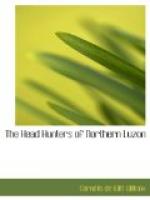Now, it is a fact that the chief demand for independence comes from the Tagalogs, the subdivision or tribe of the Filipinos (we are using the word here and elsewhere as a convenience merely) inhabiting Manila and the adjacent provinces. We speak in all kindliness when we say that they are distinguished by a certain restlessness of disposition, by a considerable degree of vanity. They are not so given to labor as some others—for example, the Ilokanos, to whom they are measurably inferior in point of trustworthiness. More numerous than any other tribe except the Visayans, they are also wealthier and better educated. Some of them have therefore earned and achieved distinction, but these are exceptions, for in general they are characterized by volatility and superficiality. They are more mixed in blood than other tribes. It is not without significance that it was these same Tagalogs who organized in the past the chief insurrections against the domination of Spain, principally, as is well known, because of the misrule of the friars. It is also a fact that the farther one removes from Manila the feebler becomes the cry for independence. If we consider the condition of the loudest supporters of the movement, we find them all, or nearly all, to be politicians, politicos. Some of these politicians are not Tagalogs—for example, Senor Osmena, the Speaker of the Assembly, is a Visayan; so that it would perhaps be more accurate to say of the entire propaganda that it is an affair of the politicians, supported chiefly by Tagalogs. In other words, it is worth while to ask ourselves if the demand for independence be real, arising out of the necessities of the people, or artificial, exploited by the politicians for ends not unfamiliar to us here in the States. It is useless to appeal for a decision to public opinion in the Archipelago, that shall include the whole population, for no such public opinion exists or can exist. And if it be argued that lack of public opinion is no disproof of the existence of a real desire for independence, the rejoinder springs at once to the tongue, that independence would be a sham where public opinion is impossible. There is cause to believe that the true aspect of the case is to be found in a remark made by a young Tagalog (to Mr. Taft himself, if we recollect aright), that there was no reason why independence should not be established at once, seeing that the two things needed already existed in the Philippines, to-wit, the governed in the shape of the peasantry of the fields, and the governors among the gente fina, the gente ilustrada (the superior classes) of Manila. However this may be, a native newspaper of Manila, distinguished by its hostility to all things American, by its insistent demand for independence, did not hesitate to accuse the wealthy Filipino class of being “refractory to the spirit of association,” of being “egotistical and disdainful toward the middle and lower classes,” and of refusing “to join their interests with those of the lower classes.” [53]




